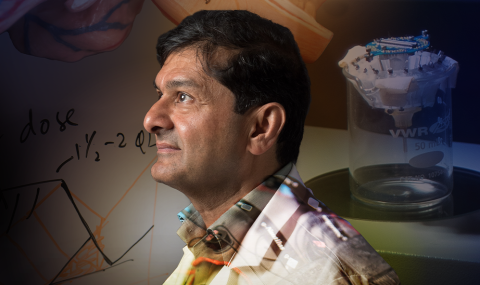MEDIA RELEASEFor Immediate Release |
(LONDON, Ontario) - Performing an ultrasound at a patient’s bedside is now faster and easier thanks to new state-of-the-art equipment and an innovative training program in London Health Sciences Centre’s emergency departments.
Ultrasound at the bedside, or “point-of-care” ultrasound, has been performed in LHSC’s two emergency departments (EDs) at University Hospital and Victoria Hospital for a number of years, allowing physicians to diagnose time-sensitive and critical issues such as fluid around the heart or internal bleeding. The two new state-of-the-art, point-of-care ultrasound machines in LHSC’s EDs can wirelessly transmit images to the hospital’s computer network, allowing physicians to review ultrasound images taken by residents and provide further feedback and training – an option not previously available to trainees.
“This new equipment and its ability to enrich our residency training program demonstrates LHSC’s commitment to advancing our academic mission while enhancing patient care and safety,” says Bonnie Adamson, President and CEO of London Health Sciences Centre.
Dr. Rob Arntfield, an ED physician and intensivist at LHSC, recently completed a year-long fellowship at The Mount Sinai Hospital in New York, learning and integrating cutting edge point-of-care ultrasound applications into the care of the critically ill patient. Since his return to LHSC, Arntfield has been working with Dr. Drew Thompson, also an LHSC ED physician, to develop new quality assurance training standards to enhance residents’ knowledge and use of this important patient care technology.
“It’s important that we ensure our residents are performing ultrasounds properly, since the success of this equipment is entirely operator-dependent,” says Arntfield, who notes that a slight twist of the ultrasound transducer can yield a totally different image.
“With our new quality assurance training process, most of our residents will now be certified to perform point-of-care ultrasounds in their first year of residency, instead of later in their training,” says Thompson, who works with Arntfield to review many of the images captured by residents. When necessary, they provide feedback and further training to ensure the best images are being captured at the patient’s bedside.
“Before the implementation of this new residency training program, a resident would not have had ready access to further teaching or feedback once he or she was certified in using point-of-care ultrasound,” says Arntfield.
To become certified, residents must complete 50 supervised scans for every indication that point-of-care ultrasound is used for, such as diagnosing fluid around the heart or internal bleeding after trauma.
The new quality assurance program will also apply to staff ED physicians, so that they also receive feedback on the quality of their point-of-care ultrasound scans. Ultimately, this will mean all LHSC emergency department physicians—both staff and residents—will have the highest and most developed skills possible for performing point-of-care ultrasounds.
“There is no other centre as large as London Health Sciences Centre in Canada with this kind of rigorous training process,” says Dr. Gary Joubert, chief of emergency medicine. “Our new ultrasound equipment with wireless capabilities, combined with our new quality assurance training process, makes LHSC a leader in safer patient care as it relates to emergency medicine point-of-care ultrasounds.”
About London Health Sciences Centre
London Health Sciences Centre has been in the forefront of medicine in Canada for 137 years and offers the broadest range of specialized clinical services in Ontario. Building on the traditions of its founding hospitals to provide compassionate care in an academic teaching setting, London Health Sciences Centre is home to Children’s Hospital, South Street Hospital, University Hospital, Victoria Hospital, two family medical centres, and two research institutes – Children’s Health Research Institute and Lawson Health Research Institute, a joint research initiative with St. Joseph’s Health Care London. As a leader in medical discovery and health research, London Health Sciences Centre has a history of over 50 international and national firsts and attracts top clinicians and researchers from around the world. As a regional referral centre, London Health Sciences Centre cares for the most medically complex patients including critically injured adults and children in southwestern Ontario and beyond. The hospital’s nearly 15,000 staff, physicians, students and volunteers provide care for more than one million patient visits a year. For more information visit www.lhsc.on.ca
- 30 -
For media inquiries contact:
Kelly Almond
Corporate Communications and Public Relations
London Health Sciences Centre
519-685-8500, ext. 77129
Kelly.Almond@lhsc.on.ca
After-hours assistance:
Call LHSC Switchboard at 519-685-8500 and ask to page the communication consultant on-call.


